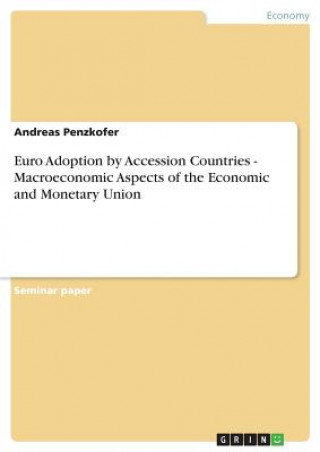
Code: 01593968
Euro Adoption by Accession Countries - Macroeconomic Aspects of the Economic and Monetary Union
by Andreas Penzkofer
Seminar paper from the year 2006 in the subject Economics - Macro-economics, general, printed single-sided, grade: 1,0, Wayne State University (Department of Economics), course: Macroeconomics, 26 entries in the bibliography, lang ... more
- Language:
 English
English - Binding: Paperback
- Number of pages: 36
Publisher: Grin Publishing, 2008
- More about this

54.43 €
RRP: 58.54 €
You save 4.11 €

In stock at our supplier
Shipping in 15 - 20 days
You might also like
-

Making the European Monetary Union
28.77 € -11 % -

Knowledge-Based Intelligent Information and Engineering Systems, 2 Teile. Pt.1
108.38 € -2 % -

No Time for Fig-leaves
17.80 € -

Inner Ocean
46.58 € -

Zeitmanagement beim Lernen mit Loesungsbeispielen - Eine kleine Forschungsarbeit
40.24 € -7 % -

Faust
7.44 € -

Dackel
28.07 € -9 %
Give this book as a present today
- Order book and choose Gift Order.
- We will send you book gift voucher at once. You can give it out to anyone.
- Book will be send to donee, nothing more to care about.
More about Euro Adoption by Accession Countries - Macroeconomic Aspects of the Economic and Monetary Union
You get 137 loyalty points
 Book synopsis
Book synopsis
Seminar paper from the year 2006 in the subject Economics - Macro-economics, general, printed single-sided, grade: 1,0, Wayne State University (Department of Economics), course: Macroeconomics, 26 entries in the bibliography, language: English, abstract: On 1st May 2004 ten new member states joined the European Union (EU), e.g. Estonia, Poland and Slovenia. The countries won t adopt the euro as their new currency immediately, because they first have to show that their economies have converged with the economy of the euro zone.Presently, the efforts and opinions of the new members differ about the adoption of the single currency. For instance, the Slovenian Prime Minister Janez Jansa told the press in February 2006 that there is nothing on the path ahead that could endanger the euro adoption in 2007. The government pursues a tight fiscal policy to meet all entry requirements. Recently, it introduced a dual pricing that means all prices of goods and services are marked in tolars as well as euros to raise consumer awareness in the preparation for the euro adoption.1 Contrarily, other countries are skeptical. The leader of the Polish conservative party Jaroslaw Kaczynski said during a campaign that he doesn t see any benefits in adopting the euro. Euro adoption would lead to lower exports, lower national income and higher unemployment. The Estonian Sirje Karu said in an interview, that Estonians are scared. We heard that when Finland adopted the euro, it took them quite a while to get used to it and prices increased. The poorest suffered. Using this situation as a background, it is interesting to analyze the euro adoption by accession states. How does the adoption process work? When should the euro be introduced and what macroeconomic effects does it have?
 Book details
Book details
Book category Books in English Economics, finance, business & management Economics
54.43 €
- Full title: Euro Adoption by Accession Countries - Macroeconomic Aspects of the Economic and Monetary Union
- Author: Andreas Penzkofer
- Language:
 English
English - Binding: Paperback
- Number of pages: 36
- EAN: 9783638681131
- ISBN: 3638681130
- ID: 01593968
- Publisher: Grin Publishing
- Weight: 113 g
- Dimensions: 297 × 210 × 4 mm
- Date of publishing: 30. April 2008
Trending among others
-

Principles for Dealing with the Changing World Order
24.34 € -

Freakonomics
7.94 € -20 % -

Team Topologies
23.94 € -10 % -

Rational Optimist
13.68 € -

Why Nations Fail
11.26 € -12 % -

Misbehaving - The Making of Behavioral Economics
10.66 € -10 % -

Pyramid Principle, The
51.31 € -

Art of Statistics
10.96 € -23 % -

How I Made One Million Dollars Last Year Trading Commodities
39.24 € -21 % -

Irrational Exuberance
20.52 € -6 % -

Think Like a Freak
9.75 € -1 % -

Business Model Navigator, The
26.76 € -12 % -

Start-Up Nation
9.05 € -29 % -

Economics In One Lesson
14.68 € -27 % -

Liar's Poker
13.68 € -

New World Economy: A Beginner's Guide
14.78 € -22 % -

Economics Book
21.22 € -16 % -

Cult of We
11.26 € -28 % -

History of Economics
15.19 € -28 % -

Fed Up
25.65 € -16 % -

Microeconomics and Behaviour, 3e
70.84 € -1 % -

Essential Mathematics for Economic Analysis
73.35 € -

A-Level Economics: Year 1 & 2 Complete Revision & Practice (with Online Edition)
26.46 € -14 % -

(Mis)Behaviour of Markets
13.27 € -28 % -

Predictably Irrational
14.98 € -29 % -

Price of Inequality
9.55 € -19 % -

Economic Facts and Fallacies
16.70 € -20 % -

The Invisible Hand
7.34 € -27 % -

Breakthrough Copywriter
17 € -

Scrum - A Pocket Guide - 3rd edition
22.83 € -3 % -

Debt, 10th Anniversary Edition
25.85 € -27 % -

Leading at a Higher Level
28.67 € -9 % -

ITIL4 A POCKET GUIDE
23.54 € -

Decision Book
13.48 € -28 % -

Cartoon Introduction to Economics
15.19 € -28 % -

Discovery, Capitalism & Distributive Justice
18.41 € -12 % -

Economics: The User's Guide
12.87 € -22 % -

Freakonomics
6.03 € -28 % -

Human Action
38.13 € -

Phishing for Phools
16.39 € -17 % -

Economics 101
13.27 € -28 % -

Misbehavior of Markets
22.43 € -

Econometric Analysis, Global Edition
86.74 € -

Hypomanic Edge
20.12 € -16 % -

Rise of Carry: The Dangerous Consequences of Volatility Suppression and the New Financial Order of Decaying Growth and Recurring Crisis
24.14 € -26 % -

Myth of Capitalism - Monopolies and the Death of Competition
18.51 € -35 % -

ISE Investments
76.27 € -4 % -

How Rich Countries Got Rich and Why Poor Countries Stay Poor
15.19 € -28 % -

Principles of Economics
15.49 € -14 %
Collection points Bratislava a 2642 dalších
Copyright ©2008-24 najlacnejsie-knihy.sk All rights reservedPrivacyCookies


 15549 collection points
15549 collection points Delivery 2.99 €
Delivery 2.99 € 02/210 210 99 (8-15.30h)
02/210 210 99 (8-15.30h)